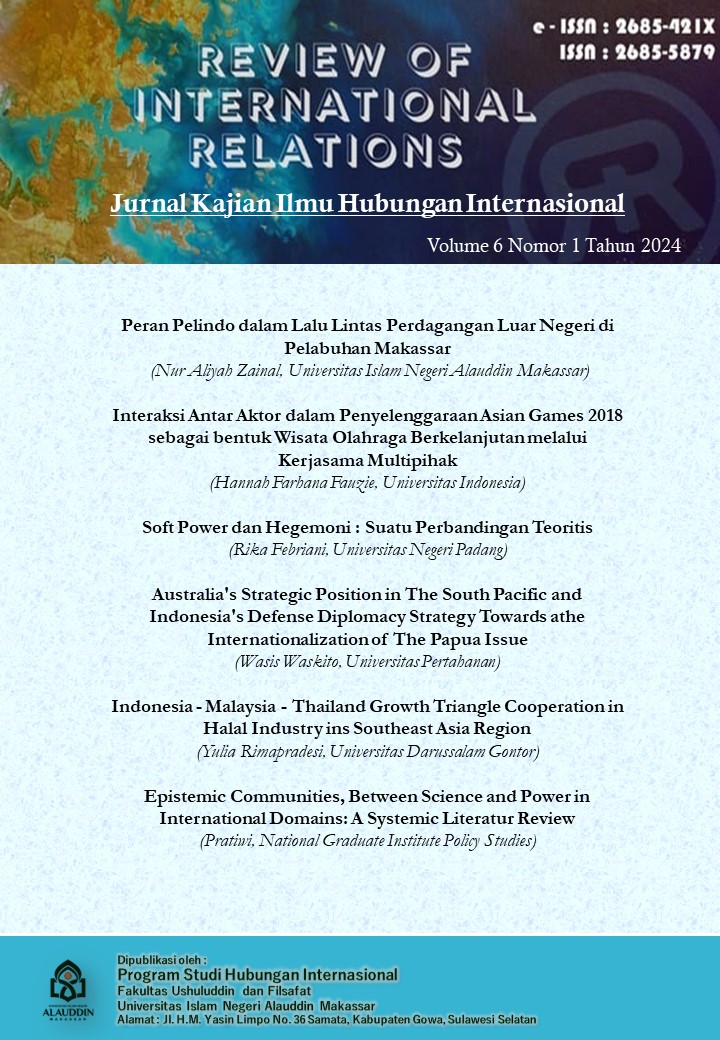ASEAN Countries on Overcoming US – China Trade War
Abstract
The trade war between the United States and China mostly has a negative impact to foreign policy in Indo-Pacific Region, included ASEAN countries. The US-China Trade war absolutely hamper ASEAN economicallyThe ASEAN nations are dealing with China-US relations as two great power states are taking big important role economically in ASEAN. This work is aim to question how ASEAN takes action from this situation to overcome the impact of Trade war and by using Neoliberalism, the paper would like to show the strategy ‘flexibility in interdependence’ which explains how the ASEAN economic integration could mitigate the problems and reducing the tensions using liberal interdependence. We conclude the flexibility in interdependence is based on two trade instrument including Generalized System Preference (GSP) and Regional Comprehensive Economic Forum (RCEP).
Downloads
References
ASEAN . (2012, June 12). Associaton of Southeast Asia Nations. Retrieved December 29, 2019, from ASEAN Framework for Regional Comprehensive Economic Partnership: https://asean.org/?static_post=asean-framework-for-regional-comprehensive-economic-partnership
ASEAN . (2018, October 13). Association of Southeast Asian Nations. Retrieved December 29, 2019, from The 6th Regional Comprehensive Economic Partnership (RCEP) Intersessional Ministerial Meeting: https://asean.org/storage/2018/10/RCEP-ISSL-MM-6-JMS-FINAL.pdf
ASEAN. (2018, July 1). Association of Southeast Asian Nations. Retrieved December 29, 2019, from The Fifth Regional Comprehensive Economic Partnership (RCEP) Intersessional Ministerial Meeting: https://asean.org/wp-content/uploads/2018/07/5ISSL-MM-Joint-Media-Statement-FINAL-1July2018.pdf
ASEAN. (2018, March 3). Assosiation of Southeast Asian Nations. Retrieved December 29, 2019, from Joint Statement of The Fourth Regional Comprehensive Economic Partnership (RCEP) Intersessional Ministerial Meeting: https://asean.org/wp-content/uploads/2018/03/JMS-4th-RCEP-ISSL-MM-FINAL-0303181.pdf
BBC News. (2017, January 20). US and Canada. Retrieved December 28, 2019, from Donald Trump: 'America first, America first': https://www.bbc.com/news/av/world-us-canada-38698654/donald-trump-america-first-america-first
Clackson, A. (2012, Februari 1). Conflict and Cooperation in International Relations. E- International Relations students.
CNN. (2018, August 4). Ekonomi. Retrieved December 28, 2019, from Cina Kenakan Tarif Balasan Untuk Produk Amerika : https://www.cnnindonesia.com/ ekonomi/20180804133135-532-319473
Firdaus, A.H., Nurhayati, E. & Irhamna, A.D.P. (2022) The impact of trade war on the ASEAN-4 economy, Macroeconomics and Finance in Emerging Market Economies, 15:3, 231-245, DOI: 10.1080/17520843.2021.1911463
Galbreath, D. (2008). International Regimes and Organizations . Issues in International Relations (2nd) .
Harvey, D. (2017). Neoliberalism as Creative Destruction . Annals of the American Academy of Political and Social Science , 610, 22.
Hendrati, I.M., Esquivias, M.A., Perdana, P., Yuhertiana, I., Rusdiyanto (2024) US-China trade war on ASEAN region: oligopoly or systemic market structure?, Cogent Business & Management, 11:1.
Hu, W. (2020, August) The United States, China, and the Indo-Pacific Strategy: The Rise and Return of Strategic Competition, China Review, Vol 20, No. 3, Special Issue SPECIAL ISSUE: State-Society Relations in China’s State-Led Digitalization: Progress and Prospects (AUGUST 2020), pp. 127-142.
Jessop, B. (2012). Neoliberalism. (G. Ritzer, Ed.) The Wiley-Blackwell Encyclopedia of Globalization, 3.
Kausikan, B. (2019) ASEAN and US-China Competition, CSCAP REGIONAL SECURITY OUTLOOK + ARF - The next 25 years 2019 Council for Security Cooperation in the Asia Pacific.
Kementrian Perindustrian. (2014, october 28). Berita Industri. Retrieved January 5, 2020, from BERITA INDUSTRI Potensi Pasar RCEP US$ 21 T: https://kemenperin.go.id/artikel/10281/Potensi-Pasar-RCEP-US$-21-T
Kimura, F., S. Urata S. Thangavelu, and D. Narjoko (2022), 'The Regional Comprehensive Economic Partnership: Challenges and Opportunities for ASEAN and East Asia', in Kimura, F., S. Urata, S. Thangavelu, and D. Narjoko (eds.), Dynamism of East Asia and RCEP: The Framework for Regional Integration. Jakarta: ERIA, pp.1-11.
Keohane, R. O. (1984). After hegemony: Cooperation and Discord in the World Political Economy. Princeton, New Jersey: Princeton University Press.
Martin, L. (2007). Neoliberalism International Relations Theories. Oxford: University Press.
OCBC Bank. (2018). Trade tariffs & its impact on ASEAN . Treasury Research & Strategy.
Petri, P. A., Plummer, M. (2020, November) RCEP: A new trade agreement that will shape global economics and politics. Brookings. Retrieved March 28, 2024 from: https://www.brookings.edu/articles/rcep-a-new-trade-agreement-that-will-shape-global-economics-and-politics/
Prima Wirayani, CNBC Indonesia . (2018, March 23). News. Retrieved December 28, 2019, from Panas Dingin AS-China yang Berujung Perang Dagang: https://www.cnbcin- donesia.com/news/20180323115216-4-8293/panas-dingin-as- Cina- yang-berujung-perang-dagang
Pujayanti, A. (2018 , April). Perang Dagang Amerika Serikat - China dan Implikasinya Bagi Indonesia. Bidang Hubungan Internasional Kajian Singkat Terhadap Isu Aktual dan strategis, X(I), pp. 7-11.
Tarzi, S. M. (2004). Neorealism, Neoliberalism and the International System . International Studies , 115-128.
the Office of the U.S. Trade Representative. (2019, December). U.S. Generalized System of Preferences. Retrieved December 29, 2019, from Guide Book: https://ustr.gov/sites/default/files/IssueAreas/gsp/GSP_Guidebook-December_2019.pdf#page=14
Vuving, A. L. (2012, July). The Future of China’s Rise: How China’s Economic Growth Will Shift the Sino-U.S. Balance of Power, 2010-2040. Asian Politics & Policy, 401-423.
Zhang, Y. (2018) The US–China Trade War, Indian Journal of Asian Affairs , Vol. 31, Nos. 1/2 (June - December 2018), pp. 53-74.
Copyright (c) 2024 Muhammad Faizal Alfian, Muhammad Arief Zuliyan

This work is licensed under a Creative Commons Attribution-ShareAlike 4.0 International License.










